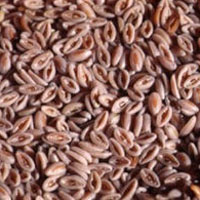Gluten Free
What does following a gluten-free diet mean? That you're embarking on an easy diet with a wide range of health-promoting effects. Instead of dwelling on what you’re giving up, consider that you’re going to enjoy a whole new world of delicious food options to meet your special dietary needs. You’ll be eating seasonally, choosing more fresh fruits and vegetables, focusing on meats, seafood, poultry, legumes, lentils, corn, and rice, and discovering fascinating ancient grains such as quinoa, amaranth, and millet. You’ll be able to eat potatoes, eggs, most cheeses, even chocolate (!)—and enjoy them without guilt because you’ll be taking good care of your body. In fact, you’ll probably end up eating—and feeling—better than ever!
Visit this page for more information about living Gluten Free
---
We carry a large variety of gluten free items, the brands listed below represent just some of the offerings we carry















More Diets
Psyllium
 © Steven Foster
© Steven FosterHow It Works
Psyllium is a bulk-forming laxative and is high in both fiber and mucilage. Psyllium seeds contain 10–30% mucilage. The laxative properties of psyllium are due to the swelling of the husk when it comes in contact with water. This forms a gelatinous mass that keeps feces hydrated and soft, provided it is taken with sufficient water. The resulting bulk stimulates a reflex contraction of the walls of the bowel, followed by emptying.1
Psyllium is a common ingredient in over-the-counter bulk laxative products. One preliminary trial found that psyllium seeds relieved constipation when it was due to lifestyle factors (e.g., inadequate fiber, sedentary lifestyle), but not when an actual disease was the cause.2 Numerous double-blind trials have found that supplementation with psyllium can lower total cholesterol and LDL (“bad”) cholesterol.3 However, levels of HDL (“good”) cholesterol are not affected by psyllium supplementation.4 The cholesterol-lowering effect of psyllium has been reported in children,5 as well as in adults.6 Psyllium supplementation has also improved blood sugar levels in some people with diabetes.7, 8, 9 The soluble fiber component of psyllium is believed to account for this effect.
In a double-blind trial, people with ulcerative colitis had a reduction in symptoms such as bleeding and remained in remission longer when they took 20 grams of ground psyllium seeds twice daily with water compared to the use of the medication mesalamine alone.10 Also, the combination of the two was slightly more effective than either alone.
How to Use It
The suggested intake of psyllium husks to treat constipation is 1 teaspoon (approximately 5 grams) three times per day. Alternatively, some references suggest taking 2–6 teaspoons (10–30 grams) of the whole seeds per day—typically taken in three even amounts throughout the day.11 This is stirred into a large glass of water or juice and drunk immediately before it thickens.12 It is best to follow label instructions on over-the-counter psyllium products for constipation. It is important to maintain a high water intake when using psyllium.
Copyright © 2025 TraceGains, Inc. All rights reserved.
Learn more about TraceGains, the company.
The information presented by TraceGains is for informational purposes only. It is based on scientific studies (human, animal, or in vitro), clinical experience, or traditional usage as cited in each article. The results reported may not necessarily occur in all individuals. Self-treatment is not recommended for life-threatening conditions that require medical treatment under a doctor's care. For many of the conditions discussed, treatment with prescription or over the counter medication is also available. Consult your doctor, practitioner, and/or pharmacist for any health problem and before using any supplements or before making any changes in prescribed medications. Information expires December 2025.











